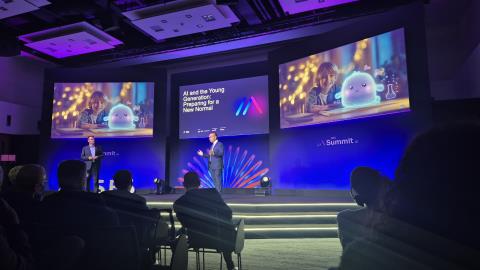Innovative Directions at the 5th SBS Summit
In the heart of Paris, near the Eiffel Tower, Eric Bierry, CEO of SBS and Deputy CEO of 74Software, inaugurated the 5th SBS Summit, setting the stage for a day filled with forward-looking discussions that aimed to redefine the outdated perception of legacy players in the industry.
Bierry commenced the summit by reflecting on the transformative impact of COVID-19 on the payments sector. He highlighted how the crisis accelerated digital transformation while also diminishing trust among users. The discussions centered around key themes including trust, sovereignty, client behavior, and embedded finance.
Bierry pointed out a vital insight: "When users engage with your app, they are not just comparing it to competitors; they are measuring their experience against platforms like Netflix and Amazon." This shift has intensified the need for innovation, with consumers now expecting more than what the industry is traditionally prepared to deliver.
The call for evolution was echoed by Laurent Nizri, CEO and founder of the Paris Fintech Forum, who joined Bierry on stage. A video montage featuring industry leaders, including the CEO of Revolut, underscored contemporary challenges and aspirations within the financial ecosystem. Both leaders acknowledged that while change has often been prolonged and repetitive, the current pace demands more immediate action from organizations.
Nizri shared a candid observation about Sopra Finance’s reputation as a legacy player, a notion that Bierry acknowledged but countered by asserting that SBS is stepping into a new era, eliminating any claims of a legacy status in technology.
Security and AI in Finance
The discussion then shifted to the pressing issues of fraud and cybersecurity—two of the most significant areas impacted by AI in the financial services sector. Neetu Wadia, CMO and Global Head of Alliances at SBS, along with Meredith Stowell, VP of Ecosystem at IBM, explored the dual challenges and opportunities presented by AI in the realm of security.
They referenced the IBM Cost of Data Breach Report 2024, noting that the industry is grappling with escalating cyber threats, with breaches taking an average of 258 days to identify and rectify. Furthermore, there’s been a staggering 71% year-over-year increase in attacks utilizing valid credentials. With the looming advent of quantum computing, urgent reforms are essential.
Their dialogue also touched on the environmental implications of AI, highlighting that AI’s growing demands on infrastructure lead to significant energy consumption. Stowell emphasized the urgent need for data centers to enhance their capabilities, even considering alternative energy sources like small nuclear power to meet the needs of AI workloads. Notably, IBM’s new z17 platform, designed with sustainability in mind, utilizes 83% less power than its predecessors, demonstrating progress toward sustainable AI solutions.
Personalization and the Future of Banking
As the day drew to a close, Andrew Steadman, CPO of SBS, presented two interconnected sessions, drawing an analogy between banking relationships and marriage—founded on trust, communication, and honesty. He observed that banks have traditionally relied on the inherent difficulties of switching providers, but with changing consumer preferences, especially among younger generations, they must now prioritize loyalty through hyper-personalization.
Steadman’s remarks paved the way for a forward-thinking discussion with Hani Hagras, Head of AI Research at the University of Essex, who has also been appointed as SBS’s Chief Science Officer. Together, they envisaged a future where banking becomes seamless and automatic, presenting innovations that may seem like science fiction today but will soon become an expected norm for future generations.
Hagras highlighted potential advancements in AI applications, such as personalized healthcare and predictive technologies that enhance public health responses. However, he also raised concerns about the environmental toll of expanding technology infrastructures, noting that some AI data centers consume as much energy as entire industries. Nonetheless, he expressed optimism for sustainable solutions through synthetic biology and evolving technologies that could lead to environmentally friendly computing.
As they concluded the day’s discussions, Steadman and Hagras previewed upcoming platform releases slated for the following year and shared an AI-generated video that painted a vision of the future, emphasizing a world that extends beyond mere technology—one rich with life and possibility for future generations.
